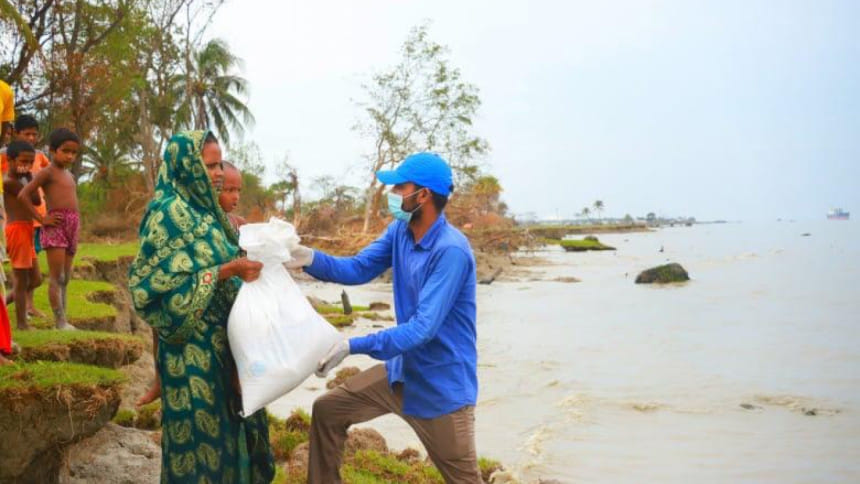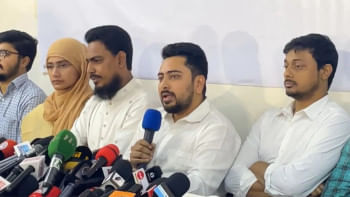Youth mobilisation during the COVID-19 pandemic

In April 2020, a group of young Bangladeshi expats got on a phone call and expressed their concerns regarding the possible impacts of the COVID-19 pandemic in Bangladesh. Public Health students Tahmid Hasib Khan and Aaraf Ahmed jotted down areas in which expatriate youths could make a credible difference in addressing the crisis at home. Their friends provided their input. As a result, the journey of BacharLorai (www.bacharlorai.com) began. Along with Khan and Ahmed, Ontario Public Servant Anil Wasif, Engineer-in-Training Aminur Rahman Khan, KPMG Risk Analyst Farhim Zaman and Data Science student Talha Khan also contributed to the project.
BacharLorai is a social movement which aims to bring together expats, citizens and grassroots organisations working on existing and new projects, to fight the pandemic in Bangladesh. It highlights individual initiatives directed towards six key focus areas: the socioeconomically disadvantaged, healthcare equipment and treatment, access to information, supply chains in rural settings, mental health and data analytics.
As of today, the movement has spearheaded over 15 multidimensional initiatives organised by individuals, grassroot organisations and youth groups. BacharLorai identified knowledge immobility, the lack of financial resourcing, information asymmetry and weak supply chain systems as key institutional barriers in addressing the challenges of the pandemic. Rather than directly fundraising for cash subsidies, BacharLorai has facilitated the creation, expansion and sustenance of a needs-based resource network, navigating tangible support to communities, health networks and frontline workers across the country.
Recognising the viability and the durability of non-state actors in crisis management, members of BacharLorai engage their communities to come together for a singular cause – connecting those who need help with those who want to help. Six projects directly led by BacharLorai have resulted in aid dissemination to over 1,700 families across marginalised communities and meal provisions to over 740 healthcare workers across four health centres. Food packages, female hygiene products and capital investments to ensure clean water and the repair of damaged infrastructural systems, including schools and houses, are currently taking place across Southern Bangladesh, impacting over 1,000 families directly affected by Cyclone Aamphan. To support frontline workers, over 1000 N-95 masks and 1000 PPEs were distributed to health networks through crowdsourced donations.
The primary aim of BacharLorai is to stand by affected populations and frontline workers, while simultaneously motivating citizens and expats to contribute in their own ways. Members of the movement communicate with grassroot healthcare workers to support health networks with tangible medical resources. This ongoing relationship between healthcare workers and BacharLorai members provides a key niche in responding through a streamlined needs-based and regional approach towards crisis management, allowing projects to focus on resource acquisition and distribution.
Onboarding Public Health Expert Nayer Sultana, the former director of the Directorate General of Drug Administration, as a consultant, paved the way for oxygen cylinders to be an area of principal focus for the movement. BacharLorai initiated its flagship project Oxygen for Life in April 2020, through a fundraising strategy which mobilised international financing via a GoFundMe scheme and a simultaneous crowdfunding drive through BKash and broader financial instruments in Bangladesh. This project successfully completed the distribution of over 118 cylinders to over 34 health centres in the country. The success of Oxygen for Life was complemented with Beds for Bangladesh, through which 44 hospital beds were distributed to partnering health networks.
To support Beds for Bangladesh and join the BacharLorai movement, seven student groups from Canada came together in July 2020 to form the Canadian Alliance of Bangladeshi Students' Associations, where Bangladeshi students' associations from Ryerson, McGill, Concordia, York and the three campuses of the University of Toronto, united to work as part of BacharLorai. The Canadian Alliance of Bangladeshi Students' Associations plan to launch similar projects under the umbrella of BacharLorai. Like its predecessor Oxygen for Life, the upcoming project, The O2 Fund, aims to acquiesce donations during Eid Ul Azha to support resource-poor health centres with much needed oxygen cylinders.
In recognising the work of youth groups and on-the-ground volunteers who are standing by Bangladesh in these difficult times, it is important to prioritise community mitigation measures in driving social change, especially with respect to organisations distinct from the purview of large corporations. BacharLorai is inspired by grassroots organisations such as Resource Coordination Network, Uttaran, Beacon, Kotha, Bidyanondo, Leaping Boundaries, Footsteps Bangladesh and other groups that sustainably invest in a shared economic model. At a stage of the pandemic when charitability is waning given tighter financial constraints, it is fundamental for social innovators to continue pioneering philanthropic programmes.
All in all, crisis management through digital social innovation can have small, yet measurable impacts, in addressing COVID-19 and its aftermath. Young individuals have a moral obligation and a unique opportunity to step up today. Bangladesh must let its healthcare experts determine policies. When it comes to community-mitigation measures through youth mobilisation, inspiring everyday citizens to respond collectively is the undeniable call of the time. To that end, BacharLorai's dedication to Bangladesh is resolute.
Mir Aftabuddin Ahmed is a graduate of Economics and International Relations at the University of Toronto and a Founding Member of the BacharLorai Movement. He can be reached at [email protected]

 For all latest news, follow The Daily Star's Google News channel.
For all latest news, follow The Daily Star's Google News channel. 



Comments